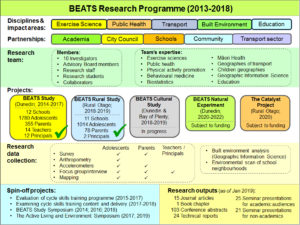11 Jul Learning Through Action: BEATS Research Programme
Environmental changes needed to promote active transport to school require time, strong relationship-building skills, extensive collaborations and a multi-sector approach. The Built Environment and Active Transport to School (BEATS) Research Programme is based on contemporary ecological models for active transport (walking or cycling) that identify individual, social, environmental, and policy influences on behaviour. The main goals of this research programme are to advance scientific knowledge and to provide service to the government, local community and schools. The programme uses the community-based participatory approach with the sustained involvement of the key stakeholders to generate locally relevant data, and facilitate knowledge translation into evidence-based policy and planning.
The BEATS Research Programme spans the fields of exercise science, health, transportation, environment and education (Figure 1). The research team involves investigators from multiple disciplines, advisory board members from the local community, a growing number of research students, and national and international collaborators.
The original BEATS Study began in Dunedin, New Zealand, in 2013 as a collaborative research project involving the Dunedin City Council, Dunedin Secondary Schools’ Partnership and University of Otago. Over the last six years, the BEATS Study has evolved into a research programme building on the strengths of the existing multidisciplinary and multi-sector partnerships.
In 2018, the original BEATS Study expanded to rural areas of the Otago region of New Zealand. Another extension includes a cultural component (i.e., what Māori and Pacific adolescents think about their transport to school). Further extensions of the BEATS Study have been designed and are subject to funding. These extensions include the BEATS Natural Experiment (to examine the effects of cycling and pedestrian infrastructure construction in Dunedin on adolescents’ transport to school behaviours) and The Catalyst Project (to inspire, empower and support adolescents in rural areas of Otago to engage with science using the BEATS Rural Study data from their own school).
The BEATS research projects utilise a variety of data collection methods ranging from adolescent and parental surveys and objective assessment of physical activity using activity meters to route and neighbourhood mapping, analysis of the built environment and focus groups and interviews.
This research programme has resulted in several spin-off projects including the bi-annual BEATS Study Symposia to disseminate BEATS findings to the local community as well as The Active Living and Environment Symposia (TALES) (www.otago.ac.nz/active-living-2019) to facilitate and grow an international, multidisciplinary and multi-sector dialogue related to Active Living and Environment.
To date, the BEATS findings have been disseminated through multiple channels including journal articles, a book chapter, conference abstracts, technical reports for stakeholders and seminar presentations for both academic and non-academic audiences.
One of the greatest challenges for the BEATS Research Programme since inception has been securing research funding for this work that spans several disciplines and involves multiple sectors.
The lessons learned during the six-year BEATS Study journey to date include the following:
- Get the right people on board. Bring onboard individuals who are willing to stretch the boundaries of the knowledge of their own sector and/or discipline. Such individuals do not have hold top positions in their organisations, but need to ready, willing and able to contribute to the team’s vision. Skills are important, but passion is essential.
- Design your project as win-win and run it as win-win. Design your initiative in a way that all involved stakeholders see and get value from being part of the initiative. Continually encourage learning together and from each other. Hold meetings regularly, provide regular progress updates to stakeholders and incorporate input from all stakeholders as much as possible (within the project’s scope, budget and timelines).
- Aim high and plan for success. Set ambitious team goals and work towards them together. Set SMART goals with detailed plan(s) for achieving them. Learn about project management and use that knowledge in planning the team’s activities. Continue to incorporate input from all stakeholders and collaborators along the way.
- Deliver on your promises. The actions of your team speak louder than your team’s words. Once you have set your goals, make sure your team delivers the proposed outputs within the proposed timeframes. Meeting stakeholders’ expectations should be your team’s highest priority to ensure stakeholders’ continuing support for the project.
- Give back and deliver value. Your project needs to provide valuable information to the stakeholders for the time and effort they invest into helping your project succeed. Giving back and delivering value to the project stakeholders is essential part of the win-win project design and successful delivery of project outcomes.
- Extend the vision… and the team. While working towards your vision, keep an open mind and remain flexible. Continue engagement across sectors and disciplines, build on the strengths of the existing partnerships, think creatively about other opportunities and pursue those opportunities if and when they arise.
- Have fun along the way. Celebrate the teamwork, strengths of the partnerships and successes along the way. Plan annual or bi-annual team get-togethers. Organise also smaller, less formal gatherings to celebrate project milestones and team’s successes throughout the year. Everyone likes to have fun!
See appendix for some examples of how those lessons learned were put into action within the BEATS Research Programme.
The ongoing involvement of key stakeholders in all stages of the BEATS Research Programme has facilitated the generation of usable data that are relevant to the local context. The BEATS findings to date have been adopted by end-users, and used in decision-making for the design of school- and city-wide programmes and initiatives in Dunedin. For example, the Dunedin City Council has used BEATS findings to inform the design of the cycle skills training programme for adolescents and to understand road safety issues around schools in the city centre to inform pedestrian infrastructure improvements. Schools have used BEATS school reports to inform the development of the school-specific health promotion initiatives and, more recently, to inform a school uniform policy change to offer an option of trousers in one of the Dunedin’s girls-only secondary schools to encourage physical and enable girls to cycle to school. This collaboration has enhanced team members’ understanding and appreciation of different priorities, processes, timelines and budget constraints across sectors for contribution to research-led health promotion initiative.
In summary, the BEATS Research Programme is an example of a successful community-academic research partnership. Such partnerships require time and long-term commitment of both academics and key stakeholders and continuing evolution to adapt, adjust and embrace new opportunities. Research programmes of this nature require appropriate level of funding to foster multidisciplinary and multi-sector partnerships, deliver wide-ranging outputs, remain sustainable in the long-term and facilitate knowledge translation into evidence-based policy and planning.
Associate Professor Sandy Mandic
Leader of the BEATS Research Programme
Active Living Laboratory (www.otago.ac.nz/active-living)
School of Physical Education, Sport and Exercise Sciences
University of Otago, Dunedin, New Zealand
Figure 1. BEATS Research Programme structure, components, spin-off projects and outputs

For more information, check out the BEATS Study website: www.otago.ac.nz/beats
Open-access article offering “a look behind the scene” about the transition of the BEATS Study from vision to implementation:
Sandra Mandic, Ashley Mountfort, Debbie Hopkins, Charlotte Flaherty, John Williams, Emily Brook, Gordon Wilson, Antoni Moore. Built Environment and Active Transport to School (BEATS) Study: Multidisciplinary and multi-sector collaboration for physical activity promotion. Retos, 2015. 28: p. 197-202. DOI: http://recyt.fecyt.es/index.php/retos/article/view/34955/19222
Open-access article describing the BEATS Study research methodology:
Sandra Mandic, John Williams, Antoni Moore, Debbie Hopkins, Charlotte Flaherty, Gordon Wilson, Enrique García Bengoechea, John C Spence. Built Environment and Active Transport to School (BEATS) Study: Protocol for a cross-sectional study. BMJ Open. 2016;6:e011196. DOI: https://doi.org/10.1136/bmjopen-2016-011196
Funding: The BEATS Study was supported by the Health Research Council of New Zealand (14/565), National Heart Foundation of New Zealand (1602 and 1615), Lottery Health Research Grant (Applic 341129), University of Otago Research Grant (UORG 2015), Dunedin City Council and internal grants from the School of Physical Education, Sport and Exercise Sciences, University of Otago. The BEATS Rural Study was supported by University of Otago Research Grant (UORG 2018) and Otago Energy Research Centre Seed Grant (2018).
Appendix
Table 1. Lessons Learned put into Action: Examples from the BEATS Research Programme
| Lesson learned | Example of implementation within BEATS Research Programme |
| Get the right people on board | · Recruitment of team members (investigators, Advisory Board members and collaborators) based on expertise needed and passion for the project
· Engagement of academics from multiple disciplines and stakeholders from relevant organisations (see text for details) · Refreshing the team as necessary based on changes in project needs (e.g., extending the project) and team members’ circumstances (e.g., moving away, change in employment, etc.) |
| Design your project as win-win and run it as win-win | · BEATS Study was initially set up as collaboration between the University of Otago and relevant stakeholders (i.e., Dunedin City Council, Dunedin Secondary Schools’ Partnership). As a result of project growth, BEATS team formed further partnerships with the Otago Secondary Schools’ Principals Association, New Zealand Transport Agency and local representatives of Dunedin’s Māori and Pacifica communities in 2017-2018.
· All stakeholders are providing input into the BEATS Research Programme and have specific tangible outputs that would benefit their organisation. · Stakeholders participate in all stages of the research process from project design and input into funding applications to project implementation, results interpretation and preparation of research outputs. · BEATS team leader (S Mandic) completed a course in project management in 2014 and used the acquired knowledge extensively in planning and managing the BETAS team and team’s activities. · BEATS Research Programme has monthly meetings of the research team and delivers regular (as necessary, but at least annual) progress reports for stakeholders and participating schools. |
| Aim high and plan for success | · At the start of the BEATS Study, BEATS Research Team set ambitious goal of achieving 100% secondary school recruitment rate in Dunedin (this goal was achieved).
· BEATS team leader (S Mandic) used project management knowledge to create detailed work breakdown structure for managing complex data collection in schools for the BEATS Study in 2014/2015. · The BEATS Study implementation included detailed monthly tracking of the recruitment process, study completion and budget. · BEATS Study acknowledged and incorporated input from both academic and non-academic team members. |
| Deliver on your promises | · BEATS team has provided timely and extensive delivery of project outputs as outlined in research grant applications and in agreement with project stakeholders. |
| Give back and deliver value | · BEATS Research team ensured comprehensive preparation of promised technical reports and seminar presentations of study results to the relevant stakeholders. |
| Extend the vision… and the team | · The original BEATS Study conducted in Dunedin was extended into the rural regions of Otago, New Zealand, in 2018-2019, extending the scope of the BEATS Study to include both urban and rural settings. Further extensions of the BEATS Study have been designed since (see text for details).
· The BEATS Research Team’s commitment to share the findings with the local, national and international community let to organisation of three local/national and two international symposia in the field of Active Living and Environment. · The BEATS Research Team has continued to evolve over the six years of the project and will continue to do so in future. Over time, some investigators became advisory board members or collaborators and vice-versa. New investigators, collaborators and advisory board members from relevant disciplines and sectors have joined the team along the way. Further growth of the team is expected in future. |
| Have fun along the way | · The BEATS Research team get-togethers include informal family-friendly team potlucks twice a year and multiple shared lunches and mini-celebrations throughout the year to celebrate team’s and team members’ achievements. |

